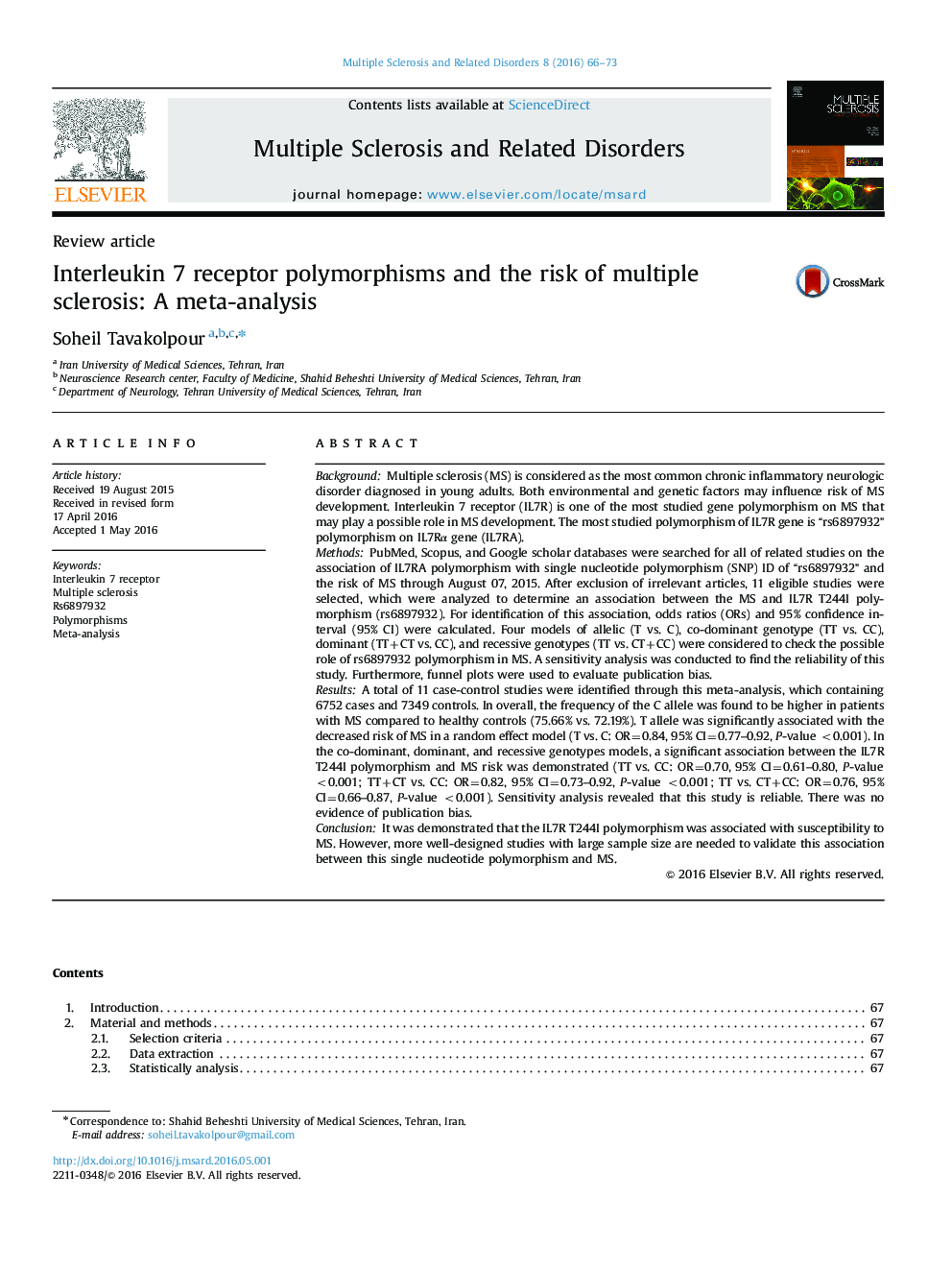| کد مقاله | کد نشریه | سال انتشار | مقاله انگلیسی | نسخه تمام متن |
|---|---|---|---|---|
| 5912298 | 1570209 | 2016 | 8 صفحه PDF | دانلود رایگان |
- Multiple sclerosis (MS) risk depends on genetic factors.
- Interleukin 7 receptor polymorphism is associated with the MS.
- CC genotype in the interleukin 7 receptor is considered as a risk factor for MS.
BackgroundMultiple sclerosis (MS) is considered as the most common chronic inflammatory neurologic disorder diagnosed in young adults. Both environmental and genetic factors may influence risk of MS development. Interleukin 7 receptor (IL7R) is one of the most studied gene polymorphism on MS that may play a possible role in MS development. The most studied polymorphism of IL7R gene is “rs6897932” polymorphism on IL7Rα gene (IL7RA).MethodsPubMed, Scopus, and Google scholar databases were searched for all of related studies on the association of IL7RA polymorphism with single nucleotide polymorphism (SNP) ID of “rs6897932” and the risk of MS through August 07, 2015. After exclusion of irrelevant articles, 11 eligible studies were selected, which were analyzed to determine an association between the MS and IL7R T244I polymorphism (rs6897932). For identification of this association, odds ratios (ORs) and 95% confidence interval (95% CI) were calculated. Four models of allelic (T vs. C), co-dominant genotype (TT vs. CC), dominant (TT+CT vs. CC), and recessive genotypes (TT vs. CT+CC) were considered to check the possible role of rs6897932 polymorphism in MS. A sensitivity analysis was conducted to find the reliability of this study. Furthermore, funnel plots were used to evaluate publication bias.ResultsA total of 11 case-control studies were identified through this meta-analysis, which containing 6752 cases and 7349 controls. In overall, the frequency of the C allele was found to be higher in patients with MS compared to healthy controls (75.66% vs. 72.19%). T allele was significantly associated with the decreased risk of MS in a random effect model (T vs. C: OR=0.84, 95% CI=0.77-0.92, P-value <0.001). In the co-dominant, dominant, and recessive genotypes models, a significant association between the IL7R T244I polymorphism and MS risk was demonstrated (TT vs. CC: OR=0.70, 95% CI=0.61-0.80, P-value <0.001; TT+CT vs. CC: OR=0.82, 95% CI=0.73-0.92, P-value <0.001; TT vs. CT+CC: OR=0.76, 95% CI=0.66-0.87, P-value <0.001). Sensitivity analysis revealed that this study is reliable. There was no evidence of publication bias.ConclusionIt was demonstrated that the IL7R T244I polymorphism was associated with susceptibility to MS. However, more well-designed studies with large sample size are needed to validate this association between this single nucleotide polymorphism and MS.
Journal: Multiple Sclerosis and Related Disorders - Volume 8, July 2016, Pages 66-73
